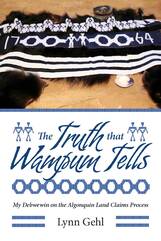 This is an excerpt from my book The Truth that Wampum Tells: My Debwewin on the Algonquin Land Claims Process. How land claims settlements are achieved is arguably the biggest issue. Essentially, they require the parties to agree on a set of rights, compensation and other benefits. It is John A. Olthuis and H.W. Roger Townshend’s (1996: 10) contention that negotiations guide the process to finalizing settlements. Coyle explains that the central component of settlements is land and land-related rights, where the latter may include “sub-surface resources, waters in the claim area, forests, wildlife and fisheries, protecting cultural artifacts, rights of access and rights of the Aboriginal group to manage and govern settlement lands.” Coyle notes that land acquisitions are achieved through First Nations using settlement money to purchase their land on the open market, or by some other means such as the province transferring Crown lands to Canada in trust for the First Nation. Interestingly, in assessing monetary compensation amounts, there are no criteria in Canada’s land claims policy. However, the policy does suggest that compensation can be resolved through cash, resource revenue sharing and even government bonds (Coyle 1997: 67-68). That said, in actuality, it is Andrew Woolford’s (2004: 121) contention that settlement mandates are actually handed down to federal and provincial negotiators from upper echelons who in reality negotiate with their own government in terms of moving outside of the relegated mandate parameters. This of course implies that the land claims process is not really a negotiation process between Indigenous nations and the governments of Canada. Rather, the negotiating occurs between government employees. References: Coyle, Michael. 1997. “Land Claims Negotiations in Canada.” In Stephen B. Smart and Michael Coyle (eds.), Aboriginal Issues Today: A Legal and Business Guide. North Vancouver: Self-Counsel. 53-78. Olthuis, John A., H.W. Roger Townshend with contributions by Roger A. Justus, Nancy J. Kleer and Evelyn J. Baxter, Morris/Rose/Ledgett. 1996. “Is Canada’s Thumb on the Scales? An Analysis of Canada’s Comprehensive and Specific Claims Policies and Suggested Alternatives.” For Seven Generations: An Information Legacy of the Royal Commission on Aboriginal Peoples. cd-rom. Ottawa: Canada Communications Group-Publishing. 1-118. Woolford, Andrew John. 2004. “Negotiating Affirmative Repair: Symbolic Violence in the British Columbia Treaty Process.” The Canadian Journal of Sociology 29, 1: 111-44. Please like and share this blog.  Lynn Gehl, Ph.D. is an Algonquin Anishinaabe-kwe from the Ottawa River Valley. She has a section 15 Charter challenge regarding the continued sex discrimination in The Indian Act, and is an outspoken critic of the land claims process. Her book The Truth that Wampum Tells: My Debwewin of the Algonquin Land Claims Process offers an insider-Indigenous analysis of the Algonquin land claims process in Ontario. She has is new book titled Claiming Anishinaabe: Decolonizing the Human Spirit with the University of Regina Press scheduled to be published in the fall of 2017. You can reach her through, and see more of her work, at www.lynngehl.com.
1 Comment
Monique Gareau
3/7/2017 09:05:43 am
Speaking from my very recent experience of enrolling as an Algonquin, communicating with various offices within the AOO group, and then trying to get clarification about the agreement in regards to real, measurable, tangible benefits that the Algonquin Nation (and our descendants) would gain upon ratification of this agreement, I am of the impression that Algonquins should be concerned about the current process. Patience is a virtue.
Reply
Your comment will be posted after it is approved.
Leave a Reply. |
|
To subscribe to Lynn's Blog: click here
To subscribe to Lynn's Newsletter: click here To follow Lynn on her Public Facebook Page: click here To subscribe to Lynn's YouTube channel: click here To book Lynn as a speaker: click here To contact Lynn/License her work: click here Copyright Dr. Lynn Gehl, 2024 All Rights Reserved
|
 RSS Feed
RSS Feed
